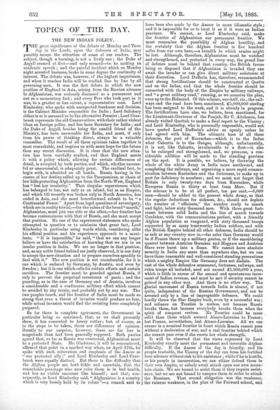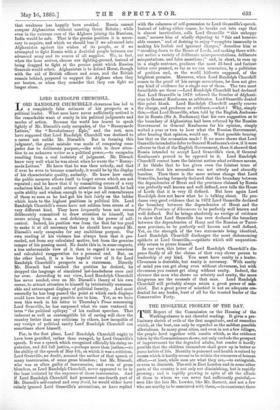TOPICS OF THE DAY.
THE NEW INDIAN POLICY. THE NEW INDIAN POLICY. THE great significance of the debate of Monday and Tuesday in the Lords, upon the defences of India, may possibly escape the attention of some of our readers. The subject, though a burning, is not a lively one ; the Duke of Argyll seemed at first—and only seemed—to be making an academic speech ; and the painful incident which on Monday night arrested business, broke in some degree the continuity of interest. The debate was, however, of the highest importance, and when it reaches India will be studied line by line by all governing men. It was the first debate in which the new position of England in Asia, arising from the Russian advance to Afghanistan, was seriously discussed as a permanent and not as a momentary fact ; and every Peer who took part in it was, to a greater or less extent, a representative man. Lord Kimberley, who spoke with unexpected frankness and decision, is the Cabinet Minister responsible for India ; Lord Salisbury either is or is assumed to be the alternative Premier ; Lord Oranbrook represents the old Conservatives, with their rather violent ideas on foreign policy, and has been Secretary for India ; and the Duke of Argyll, besides being the candid friend of the Ministry, has been answerable for India, and must, if only from his power of thinking direct, always be a valuable counsellor. The result of all these opinions taken together is most remarkable, and inspires us with more hope for the future than any recent discussion. It is clear that the new situation has been carefully studied, and that England meets it with a policy which, allowing for certain differences of detail, is accepted by both parties, and which, whether successful or unsuccessful, is adequately great. The cardinal fact, to begin with, is admitted on all hands. Russia having in the course of her destiny rolled up to the Paropamisus, or chain of low hills protecting Afghanistan from the North-West, England has "lost her insularity." That singular separateness which has belonged to her, not only as an island, but as an Empire, and which till recently was broken only in North America, has ended in Asia, and she must henceforward submit to be "a Continental Power." Apart from legal questions of sovereignty, which are in reality trivial,—for the rulers of the broad" march," Afghanistan, must join one side or the other,—her frontier has become conterminous with that of Russia, and she must accept that position. No one of the experienced statesmen who spoke attempted to question or to minimise that great fact, Lord Kimberley in particular using words which, considering alike his official position and his experience, approach to a manifesto. "It is impossible," he said, "that we can any longer believe or have the satisfaction of knowing that we are in an insular position in India. We are no longer in that position, and, as my noble friend behind me justly observed, it is our duty to accept the new situation and to prepare ourselves speedily to deal with it." The new position is not unendurable, for it is one which is endured by Germany, by Austria, and even by Sweden ; but it is one which calls for certain efforts and certain sacrifices. The frontier must be guarded against Russia, if only to prevent the perpetual recurrence of panic ; and the guarding, as in the case of Germany and of Austria, involves a considerable and a continuous military effort which cannot be avoided by Lilly treaty, and probably not by any war. The two peoples touch, and the frontier of India must be made so strong that even a threat of invasion would produce no fear, while actual invasion would find the resisting force completely prepared.
So far there is complete agreement, the Government in particular being so convinced, that, as we shall presently show, it has consented to heavy outlay ; but, of course, as to the steps to be taken, there are differences of opinion. Greatly to our surprise, however, these are far less in magnitude than had been generally supposed. Both parties agreed that, so far as Russia was concerned, Afghanistan must be a protected State. Mr. Gladstone, it will be remembered, affirmed that point in a marked way when, on April 27th, he spoke with such reiteration and emphasis of the Ameer as "our protected ally ;" and Lord Kimberley and Lord Oranbrook were equally distinct. But there is the difficulty that the Afghan people are both fickle and uncertain, that the remarkable personage who now rules them is in bad health, and has no visible successor like himself ; and that, consequently, as Lord Kimberley said, "Afghanistan is a country which is very loosely held by He rulers "—a remark said to have been also made by the Ameer in more idiomatic style ; and it is impossible for us to treat it as if it were an Indian province. We cannot, as Lord Kimberley said, make the frontier of Afghanistan our permanent frontier. We must remember *he possibility of Afghan hostility, and the certainty that the Afghan frontier is five hundred miles from our own base,—a breadth in which armies might be lost. Although, therefore, Afghanistan must be watched. and strengthened, and protected in every way, the grand line of defence must be behind that country, the British forces being so disposed that if Afghanistan is invaded they can await the invader or can give direct military assistance at their discretion. Lord Dufferin has therefore, recommended that strong fortifications should be constructed at Quetta and on the Indus, and that the whole frontier should be connected with the body of the Empire by military railways, and "a great military road," running, as we conceive the plan, even up to the Helmand. Of this scheme, one-half, viz., the railways and the road have been sanctioned, £5,000,000 sterling has been assigned to the work, and it is already in progress. The fortifications have also, we believe, been sanctioned, for the Lieutenant-Governor of the Punjab, Sir C. Aitcheson, has already visited Quettah to make a final report to the Viceroy ; and Lord Kimberley, who is personally responsible, would not have quoted Lord Dufferin's advice so openly unless he had agreed with him. The ultimate base of all these defences, the port of Kurrachee—which is to the Indus what Calcutta is to the Ganges, although, unfortunately, it is not, like Calcutta, invulnerable to a fleet—is also to be enlarged and strengthened, and, we presume, a con siderable addition will be made to the standing garrison on the spot. It is possible, we believe, by throwing the whole of the white Army in India more northward, and completing the railways, and organising a more rapid commu nication between Kurrachee and the fortresses, to make up in part for deficiency in numbers ; and we must not forget that Britain is only twenty-two days from Kurrachee, while European Russia is thirty at least from Merv. But if the scheme is to be at all perfect, ten per cent. —6,000 men—should be added to the present white Army, so that the regular deductions for sickness, &c., should not deplete the number of " efficients," the number ready to march and fight, below sixty thousand men. With three great fort resses between solid India and the line of march towards Candahar, with the communications perfect, with a friendly Afghan population as vanguard, with sixty thousand troops supported by as many trustworthy Indian soldiers, and with the British Empire behind all other defences, India should be as safe as any country now is,—far safer than Germany would be if France threw up a military genius, or if the smouldering quarrel between Austrian Germans and Magyars and Austrian Slays over burst into a flame. We cannot have absolute security in India any more than anywhere else, but we can have those reasonable and well-considered standing precautions which a mighty Empire like Germany does not disdain. The cost of the whole defensive armament, fortresses, railways, and extra troops all included, need not exceed £1,000,000 a year, which is little in excess of the annual and spontaneous incre ment of Indian revenue, and must be met if security cannot be gained in any other way. And there is no other way. The glacial movement of Russia towards India is almost, if not quite, independent of the Russian Government, and can be arrested only by a line of impregnable defences. We could hardly throw the Slav Empire back, even by a successful war; and reliance on Treaties is useless, not because Russia breaks them, but because everybody breaks them when the spirit of conquest revives. No Treaties could be more . solid than those which secured Alsace-Lorraine to France ; but France, nevertheless, lost Alsace-Lorraine. All we can ensure is a nominal frontier in front which Russia cannot pass without a declaration of war, and a real frontier behind which she cannot pass even if she exerts her whole strength.
It will be observed that the views expressed by Lord Kimberley exactly meet the permanent and incurable Afghan difficulty. If the Ameer of the day is friendly, and his people tractable, the Viceroy of the day can from his fortified base advance without risk to his assistance • while if he is hostile, or his people in insurrection, we can either defend them in their own despite, or calmly await attack upon our own mountain chain. We are bound to assist them if they require assistance, but we are not bound to conquer them in order to attack the Russians. That second obligation was the weakness, the ruinous weakness, in the plan of the Forward school, and that weakness has happily been avoided. Russia cannot conquer Afghanistan without meeting Great Britain ; while even in the extreme case of the Afghans joining the Russians, India would be safe. That is the precise position it is necessary to acquire, and which we should lose if we advanced into Afghanistan against the wishes of its people, or if we attempted to fight Russia with a doubtful people between our advanced army and its source of all supplies. We, in fact, when the hour arrives, choose our fighting-ground, instead of being dragged to fight at the precise point which Russian Generals would select. Afghanistan is to defend Herat, though with the aid of British officers and arms, and the British remain behind, prepared to support the Afghans when they are beaten, or when they consider that they can fight no longer alone.



































 Previous page
Previous page